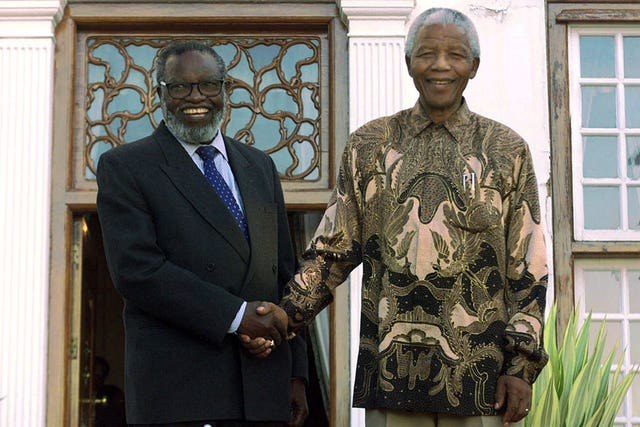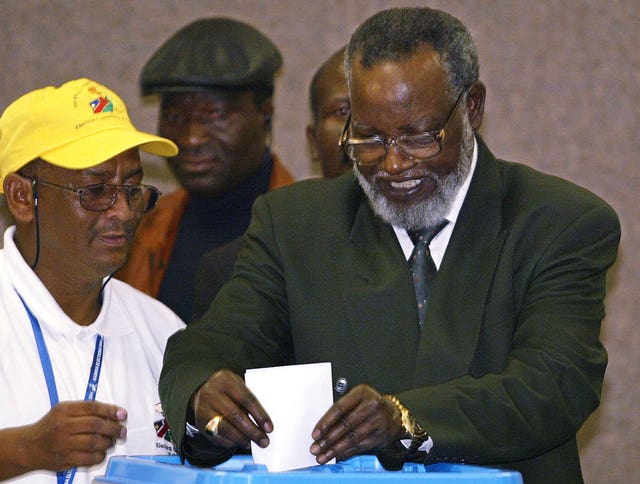Namibia’s first president and ‘founding father’ of nation dies aged 95
Sam Nujoma was said to have ‘marshalled the Namibian people during the darkest hours of our liberation struggle’.

Sam Nujoma, the fiery white-bearded freedom fighter who led Namibia to independence from apartheid South Africa in 1990 and served as its first president for 15 years, has died aged 95.
The death of Mr Nujoma, who became known as the father of his nation, was announced on Sunday by current Namibian President Nangolo Mbumba.
Mr Mbumba said Mr Nujoma died on Saturday night after being admitted to hospital in the capital, Windhoek.
Mr Mbumba added: “Unfortunately, this time, the most gallant son of our land could not recover from his illness.”
Mr Mbumba said Mr Nujoma “marshalled the Namibian people during the darkest hours of our liberation struggle.”
Mr Nujoma was revered in his arid, sparsely populated homeland in south-western Africa as a charismatic father figure who steered it to democracy and stability after long colonial rule by Germany and a bitter war of independence from South Africa.
He spent nearly 30 years in exile as the leader of its independence movement before returning for parliamentary elections in late 1989, the first democratic vote in the country. He was elected president by politicians months later in 1990 as Namibia’s independence was confirmed.
Mr Nujoma was the last of a generation of African leaders who brought their countries out of colonial or white minority rule that included South Africa’s Nelson Mandela, Zimbabwe’s Robert Mugabe, Zambia’s Kenneth Kaunda, Tanzania’s Julius Nyerere and Mozambique’s Samora Machel.
Many Namibians credited Mr Nujoma’s leadership for the process of national healing and reconciliation after the deep divisions caused by the independence war and South Africa’s policies of dividing the country into ethnically based regional governments, with separate education and healthcare for each race.

Despite his pragmatism and nation-building at home, Mr Nujoma often hit foreign headlines for his fierce anti-western rhetoric.
At a United Nations conference in Geneva in 2000, Mr Nujoma stunned delegates when he claimed Aids was a man-made biological weapon. He also occasionally waged a verbal war on homosexuality.
He once banned all foreign television programmes, declaring they had corrupted the youth of Namibia.
Mr Nujoma built ties with North Korea, Cuba, Russia and China, some of which had supported Namibia’s liberation movement by providing arms and training.
But he balanced that by reaching out to the West, and Mr Nujoma was the first African leader to be hosted at the White House by former US president Bill Clinton in 1993. Mr Clinton called Mr Nujoma “the George Washington of his country” and “a genuine hero of the world’s movement towards democracy”.
Mr Nujoma also advocated for the advancement of women in a largely patriarchal region, saying “there is no shortage of competent and experienced African women to lead the way forward”.

Mr Nujoma grew up in a rural, impoverished family, the eldest of 11 children. His early life revolved around looking after his parents’ cattle and the cultivation of land. He attended a mission school before moving to Windhoek and working for South African Railways.
He was arrested following a political protest in 1959 and fled the territory shortly after his release to go into exile in Tanzania.
In exile, he helped establish the South West African People’s Organisation (SWAPO) and was named its president in 1960. It has been Namibia’s ruling party since 1990, and Mr Nujoma ultimately led it for 47 years until stepping down in 2007.
When South Africa refused to heed a 1966 UN resolution ending the mandate it had been given over the German colony of South West Africa after the First World War, Mr Nujoma launched a guerrilla campaign.
“We started the armed struggle with only two sub-machine guns and two pistols,” Mr Nujoma once said. “I got them from Algeria, plus some rounds of ammunition.”
The SWAPO never achieved military victory in an independence war that lasted more than 20 years, but Mr Nujoma won wide political support during his exile, leading to the UN declaring the SWAPO the sole representative of the Namibian people and South Africa ultimately withdrawing from the country.
As he mixed with world leaders, Mr Nujoma was aware of his lack of education. He left school early to work and later attended night school, largely to improve his English. He said he instead dedicated his life to his country’s liberation.
“Others got their education while I led the struggle,” he said.





